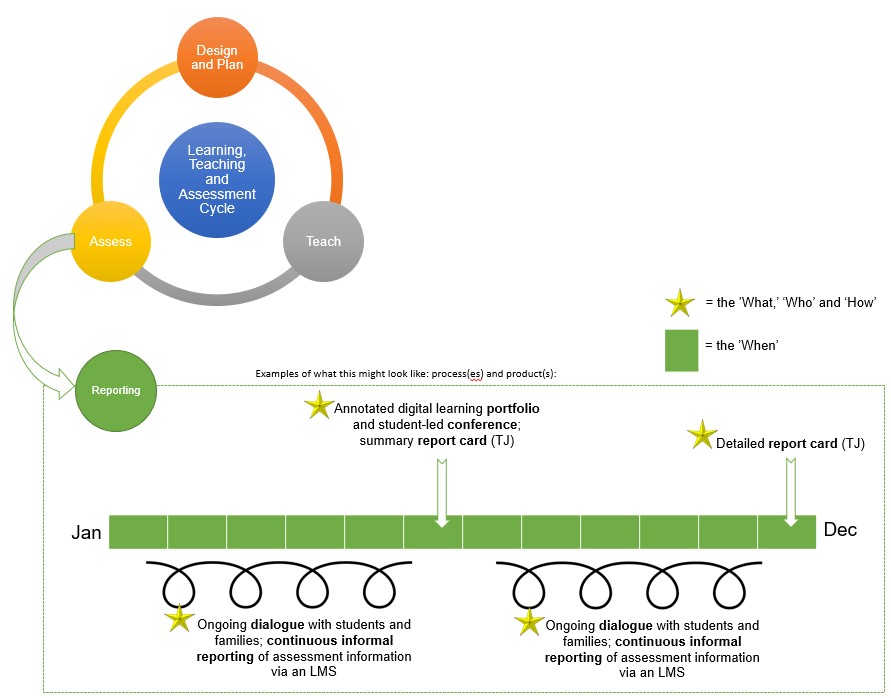The purpose of assessment and reporting
Assessment establishes where students are in their learning at a point in time. It is an ongoing, shared endeavor (Masters, 2013 & 2021). It helps understand how to best support the continued progress of learners (Smith & Smith, 2014).
Reporting communicates where students are in their learning. It informs parents, carers, students, and educators about student achievement and progress (Hollingsworth, Heard & Weldon, 2019)

The above image shows the learning, teaching, and assessment cycle with three sequential components: Design and Plan, Teach and Assess linking to Reporting. Connected to this is a yearly timeline showing ongoing informal reporting and dialogue, with reporting products released in June and December
How does assessment need to be understood if it is to contribute to meaningful student reporting?
To make meaningful reports, assessment needs to be understood as:
- a dynamic space of learning interactions. Teachers learn with and from students. Together they strive to create the conditions for success (Willis and Cowie, 2014).
- a process that positions students as active participants. It can afford them opportunities to be active agents in their learning. As they grow as assessment-capable learners, leaders and teachers should seek to know: 'How can students make themselves known to us?' (Wyatt-Smith, 2015).
- an area where issues of justice, access, and equity can arise. These issues can guide how we plan to learn and create partnerships. They also direct how we communicate student development and progress in meaningful ways (Wyatt-Smith, Klenowski & Colbert, 2014).
- a means of creating powerful learning experiences. Let assessment allow more students to become effective and confident learners for life by balancing our understanding of how well students "do school" with their learning engagement. (Wyatt-Smith, Klenowski & Colbert, 2014,. p 16).
- a way to accurately communicate the learner's growth.
To make meaningful reports, assessment needs to be guided by these values:
- every learner can learn and is capable of growth. They can progress along a well-articulated and scaffolded path that stretches and challenges them (Masters 2021, 2016; Lucas, 2021).
- each learner, within any age cohort, maybe at different points in their learning. They may be progressing at different rates too. (Masters, 2021).
- quality assessment practices need to be embedded within teaching and learning. This involves understanding learners': knowledge and understanding skills attitudes and dispositions.
- reporting processes include continuous informal reports, ongoing dialogue with students and their families, learning conferences and formal semester reports.
What does it mean to develop as assessment-capable learners?
Quality assessment helps each student to strengthen their assessment capabilities. It helps them use multiple forms of evidence, such as portfolios, artifacts, performances, and tests. This evidence informs their learning progression, in partnership with teachers, families, and peers.
Quality assessment means all school community members contribute to developing assessment-capable learners. It means they are aware of their capacity to:
- apply existing knowledge and understanding to unfamiliar contexts
- use skills and capabilities in authentic, collaborative contexts, to deepen their understanding;
- develop insight into themselves as learners and how they learn (Hipkins, 2014; Wyatt-Smith, 2014).
Teachers and leaders should enable learning partnerships with students and families. This allows students to become assessment-capable learners. It also means students are more likely to be active agents in their learning (Masters, 2014).
Leaders and teachers can support this by:
- scaffolding assessment co-design opportunities with students
- analyzing evidence from many assessment opportunities.
- creating safe and fair assessment learning cultures. Here, all students progress and achieve over time.
How quality assessment supports meaningful student reporting
Meaningful student reporting depends on:
- the quality and authenticity of continuous assessment practices
- regular gathering of evidence of student learning
- meaningful use of evidence when reporting
- including a variety of reporting processes.
References
- Hargreaves, A., & Shirley, D. (2009). The fourth way: The inspiring future for educational change. Thousand Oaks, Calif.: Corwin Press.
- Hollingsworth, H., Heard, J., Hockey, A., & Knuckey, T. (2021). Reporting student progress: What might it look like? ACER Research Conference 2021.
- Hollingsworth, H., Heard, J., & Weldon, P. (2019). Communicating student learning progress: A review of student reporting in Australia. ACER.
- Masters, Geoff N. (2016). A commitment to growth. Teacher, 24 October 2017. Retrieved from https://www.teachermagazine.com.au/columnists/geoff-masters/a-commitment-to-growth.
- OECD. (2013). Synergies for better learning: An international perspective on evaluation and assessment synergies for better learning. OECD Publishing, Paris http://dx.doi.org/10.1787/9789264190658-en.
- Smith, J. & Smith, L. Developing assessment tasks. In Wyatt-Smith, C., Klenowski, V., & Colbert, P. (Ed.) Designing assessment for quality learning. London: Springer.
- Willis, J. & Cowie, B. (2014). Assessment as a generative dance. In Wyatt-Smith, C., Klenowski, V., & Colbert, P. (Ed.) Designing assessment for quality learning. London: Springer.
- Wyatt-Smith, C. (2015) Assessment standards, 'intentional alignment' and dialogic inquiry. ACER Research Conference. Learning Assessments. Designing the Future. Melbourne.
- Wyatt-Smith, C., Klenowski, V., & Colbert, P. (2014). Assessment understood as enabling. A time to rebalance Improvement and Accountability Goals. In Wyatt-Smith, C., Klenowski, V., & Colbert, P. (Ed.) Designing assessment for quality learning. London: Springer.